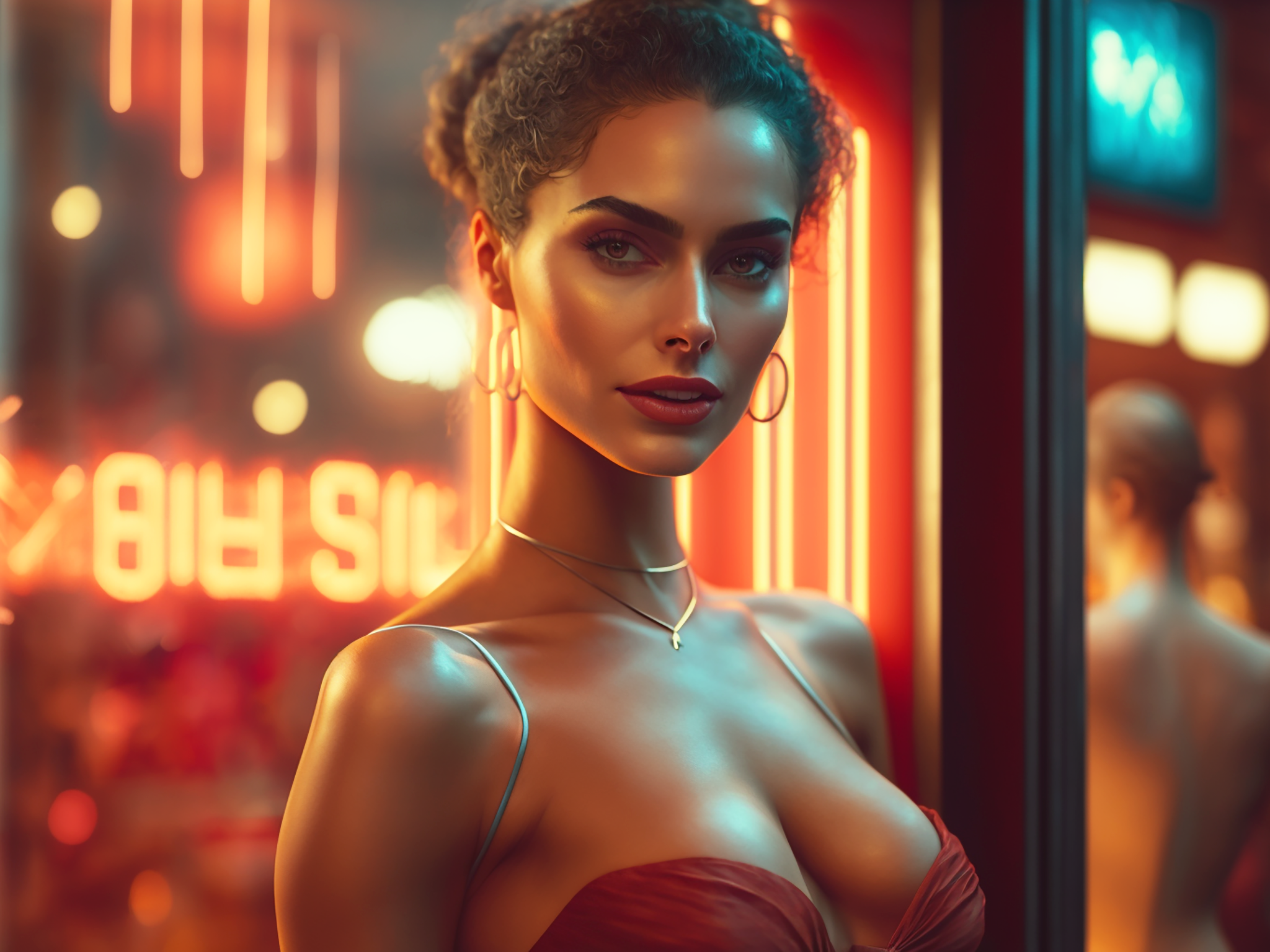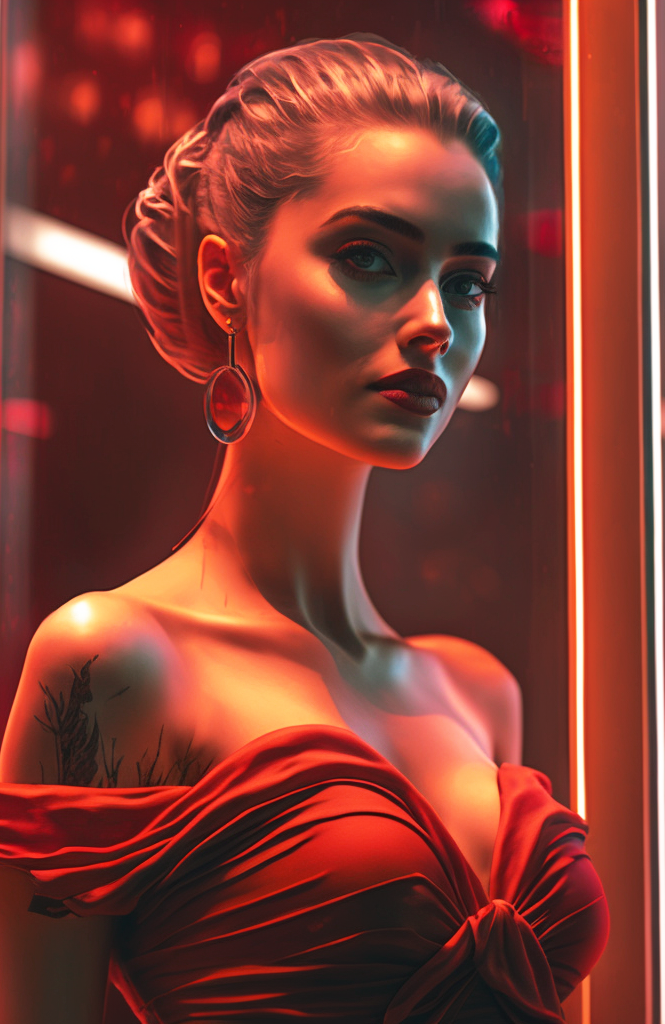This woman was made by a computer. Is she the future of heterosexual desire?
Corners of the internet have praised the arrival of (relatively) life-like women entirely generated by artificial intelligence, writes Matthew Neale. But what do these eerily homogenised women say about straight men, and should we be scared?

Your support helps us to tell the story
From reproductive rights to climate change to Big Tech, The Independent is on the ground when the story is developing. Whether it's investigating the financials of Elon Musk's pro-Trump PAC or producing our latest documentary, 'The A Word', which shines a light on the American women fighting for reproductive rights, we know how important it is to parse out the facts from the messaging.
At such a critical moment in US history, we need reporters on the ground. Your donation allows us to keep sending journalists to speak to both sides of the story.
The Independent is trusted by Americans across the entire political spectrum. And unlike many other quality news outlets, we choose not to lock Americans out of our reporting and analysis with paywalls. We believe quality journalism should be available to everyone, paid for by those who can afford it.
Your support makes all the difference.A new singularity has arrived. For centuries, scientists, philosophers and James Cameron movies have speculated about a technological event horizon: the moment that artificial intelligence overtakes the puny minds that birthed it and establishes a new world order, typically slated to end in global war and the enslavement of humanity. Fortunately for the human race, the latest technological leap doesn’t involve robots’ superior ability to think, fight, or undermine its enemies, but rather their capacity to make straight men horny.
At least, that’s the narrative emanating from certain corners of the internet. “It is so over,” one Twitter user gushed in a viral post this month that showcased an assortment of women entirely generated by AI – each one defined by small waists, childlike facial features, and large breasts. The images are made to look like real photographs, with some of the “women” holding their hands aloft as if to indicate that the picture is a selfie. But these women don’t exist. Or, at least, they only exist as a collage of real faces and bodies previously fed into the AI to teach it what an attractive woman supposedly looks like. The only tell that they’re computer-generated is often an amusing inability to render fingers and hands accurately. It evokes the anatomical detail of a child’s notepad scribbles as much as a celebrity pin-up.
What, precisely, are these men suggesting is “over”? The sexual preference for images of “real” women over digitally curated ones? Or something deeper? It’s certainly big business: last year, a Discord community called Unstable Diffusion was created with the aim of training AI to get better at producing pornography. In this case, “better” doesn’t just mean less subtle body horror in the images, but also “hotter” people – a subjective metric that’s still playing to some problematic ideas of what constitutes an attractive body.
The psychological impact of pushing an endless conveyor belt of “ideal” feminine aesthetics has enormous potential for harm. This is especially true if said “ideal” presents sexual perfection as exclusively white, thin, and entirely lacking in sexual agency or a sense of female pleasure beyond the desire to please straight men. These are representative of bigger problems that feminism faces in the 21st century, and will require the continued decentring of women’s bodies as passive vehicles for male lust.
Ness Cooper, a clinical sexologist and therapist, is well aware of these problems, but is also keen to point out that new technological developments have historically been accompanied by moral panics that aren’t always justified. “Generally, when people’s concerns around digital devices focused on sex and eroticism arise, there’s a fear that they will [lead to] a dystopian world [that takes] away human autonomy,” she explains, “when in fact many of these forms of technology have been integrated into our lives, relationships and sex lives long before they become a moral panic or media trend.”
It’s perhaps telling that capitalist societies’ first reaction to developments in automation is always fear rather than relief or even delight. Cooper notes that when CGI porn first became popularised, people worried about similar things: that it would take away what is human when it comes to eroticism and emotions around sex. “We know this didn’t happen,” she adds. “I strongly doubt there ever will be the one porn that rules them all, as that’s not how our brains work when it comes to sexual fantasies and erotic images – simply put, we are all different and enjoy different things.”
OnlyFans creators are becoming more AI – I’ve got an option on my edit software for an ‘AI edit’, for example
Some technological advancements may also prove to be safe ways of catering to the “different things” that people enjoy – which can be playful, humorous and sexy in ways that an AI-generated photoset and chatbot isn’t quite capable of recreating just yet. Alex Sim-Wise, a 41-year-old model whose career has ranged from magazine covers and television work to a successful OnlyFans account, is taking a break from editing a more niche video of her running around her garden in a Slipknot mask when we speak. She thinks the debate surrounding authenticity versus artifice in sex work might be a false dichotomy.
“There’s a whole subsection of creators who alter their identity,” she tells me. “I think OnlyFans creators have already been using [this kind of technology] without really knowing it sometimes, with all the apps that we use to edit our content. They are AI, essentially, and are becoming more AI – I’ve got an option on my edit software for an ‘AI edit’, for example, which makes you into a slightly different person.”
Humanity is still a fundamental part of the dynamic between performer and subscribers, though. Laura Lux, an adult content creator, recently tweeted that she isn’t worried about the rise in AI pornography, specifically because so much of OnlyFans is driven by personalities. “People do not subscribe to my OnlyFans because they want to see a random naked woman,” she wrote. “They subscribe to my OnlyFans because they want to see me naked specifically, based on a parasocial connection formed by following me on other social media platforms.” Lux, like many other creators on the site, transitioned to adult content after making her name on more PG-rated social media platforms, with her following attracted to her online persona as much as her appearance. “[Breasts] belonging to a realistic AI-generated character will never be as interesting as [breasts] belonging to a girl I subscribe to on YouTube,” she wrote. “No matter how ‘perfect’ or conventionally attractive the AI image is.”
So while it’s unlikely that such technology will come to dominate the erotic industry, there is potential for collaboration between AI and real-life sex workers. For Sim-Wise, who is autistic and admits that she struggles to talk to fans, the appeal of replacing the chat element of her work – particularly as ChatGPT and similar programs continue to gain traction and useability – remains enormously appealing. “I think if I could replace my chat with AI, I’d probably do a lot better,” she admits. If AI can talk the talk as well as walk the walk, the implications for neurodiverse sex workers might be more empowering than limiting.

“What people who don’t do this don’t realise is that people will masturbate over anyone,” Sim-Wise says. “They’ll masturbate over a weather person, or they’ll masturbate over their favourite butcher, someone that they see every day. You can’t police people’s wank-bank material.” What hasn’t changed is humanity’s fascinating ability to be turned on by the wildest and unlikeliest of kinks, and there’s room to celebrate that variety where consent and respect are to the front.
The darker side of digital manipulation remains undeniable, particularly with the troubling uptick in deepfake porn videos that raises a huge number of consent issues. But ultimately, like a lot of new technology, its potential as a dystopian nightmare or useful adaptive tool rests in how we choose to apply it.
“If AI can help with that, good for you,” Cooper concludes towards the end of our conversation. “It’s been here for a lot longer than most realise, and it’s here to stay.”


